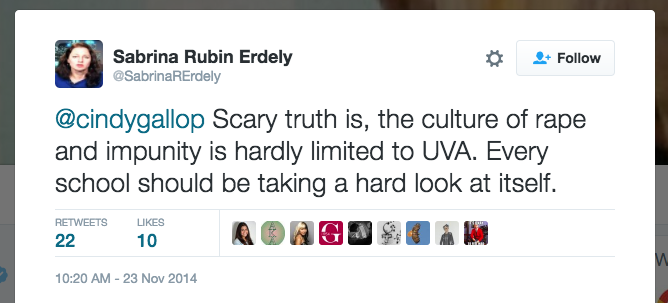

2016 has been a banner year for "journalism." First Gawker, the web's most toxic site was found to have breached the privacy of Terry Bollea, i.e. Hulk Hogan, receiving a penalty verdict of 115 million dollars.
Now a jury has found Rolling Stone reporter Sabrina Rubin Erdely guilty of libel against former University of Virginia associate dean Nicole Eramo in a wholly debunked 9,000 word clickbait article entitled "A Rape on Campus." The story involving a woman named "Jackie," who claimed a fraternity gang raped her, turned out to be a work of fiction.
@cindygallop Scary truth is, the culture of rape and impunity is hardly limited to UVA. Every school should be taking a hard look at itself.
— Sabrina Rubin Erdely (@SabrinaRErdely) November 23, 2014
The story fell apart within days after actual journalists at the Washington Post did the job of journalists, investigating the story and finding discrepancies "including that there was no party at the fraternity on the night she said she was attacked nor anyone matching the description of the assailant on campus."
Rolling Stone retracted the story some five months later after realizing "Jackie," the central figure in the story, made claims that held no water. But just like Gawker on Hulk Hogan, the damage was already done. Eramo filed a defamation suit as the story painted her as a monster who didn't care about campus rape reports. At heart of the defamation suit was whether Eramo could be considered a public figure. The judge hearing the case determined she could be, which makes sense considering how the story went viral.
According to The Chicago Tribune "Eramo's attorneys argued that Erdely came into the story with a preconceived storyline about institutional indifference to sexual assault and intentionally disregarded statements and facts about Eramo that didn't fit that narrative. They claimed Erdely also ignored red flags about Jackie's credibility, including the changing account of Jackie's rape and her refusal to let Erdely talk to people who could corroborate her story.
After only three days, they reached their verdict.
Rolling Stone released a statement after the verdict, apologizing to Eramo while standing by its efforts that in part read
"It is our deep hope that our failings do not deflect from the pervasive issues discussed in the piece, and that reporting on sexual assault cases ultimately results in campus policies that better protect our students. We will continue to publish stories that shine a light on the defining social, political and cultural issues of our times, and we will continue to seek the truth in every story we publish."
Eramo's lawyers laid a clear case against an indifferent magazine and painted Erdely as having “a preconceived story line,” and acted with “reckless disregard,” by ignoring conflicting information in her reporting." One lawyer, Tom Clare stated “Once they (Rolling Stone) decided what the story was going to be about, it didn’t matter what the facts were.”
Evidently, this was a much more persuasive argument than that of Rolling Stone and Erdely being portrayed as the real victims of a hoax, and one which cased Erdely her reputation as well as her job. It should be noted that when the campus rape story fell apart, other journalists looked into Erdely's past articles and have thrown into doubt at least one other story that also involved rape, but that time the setting was within the Catholic Church and not on college campuses.
Despite Rolling Stone's dedication to ethical journalism, the Virginia campus rape story is a classic example of the media not letting facts get in the way of a good story, especially one that feeds confirmation bias. Thankfully, truth prevailed but only after a lengthy expensive legal battle.
Advertisers should take note of stories like these. Rolling Stone was once the brand known for sharp-shooting journalists and daring reporting. It was the magazine where Elton John came out of the closet, where Paul Getty and Patty Hearst spoke about their kidnapping ordeals, and where Karen Silkwood's murder theory was introduced. In the 1980s, Fallon McElligott Rice helped reshape the Rolling Stone brand to attract advertisers with their "Perception, Reality" campaign that showed what the readers of Rolling Stone really were like. No more old hippies with yin-yang yoga, but instead conscious consumers who recycled and surfed with a remote control not a surfboard. That rebranding feels ironic today, when one of Rolling Stone's journalists seemed to have their own version of reality. Like toxic Gawker, before it, Rolling Stone's reputation is in doubt, and placing your brand alongside their brand will have that bad juju rub off on your brand. Will Rolling Stone be able to change our current perception of their magazine? It might take a miracle, or a new Tom McElligott.
Reminder, Gawkers baby sister Jezebel tweeted this:
- reply
Permalink